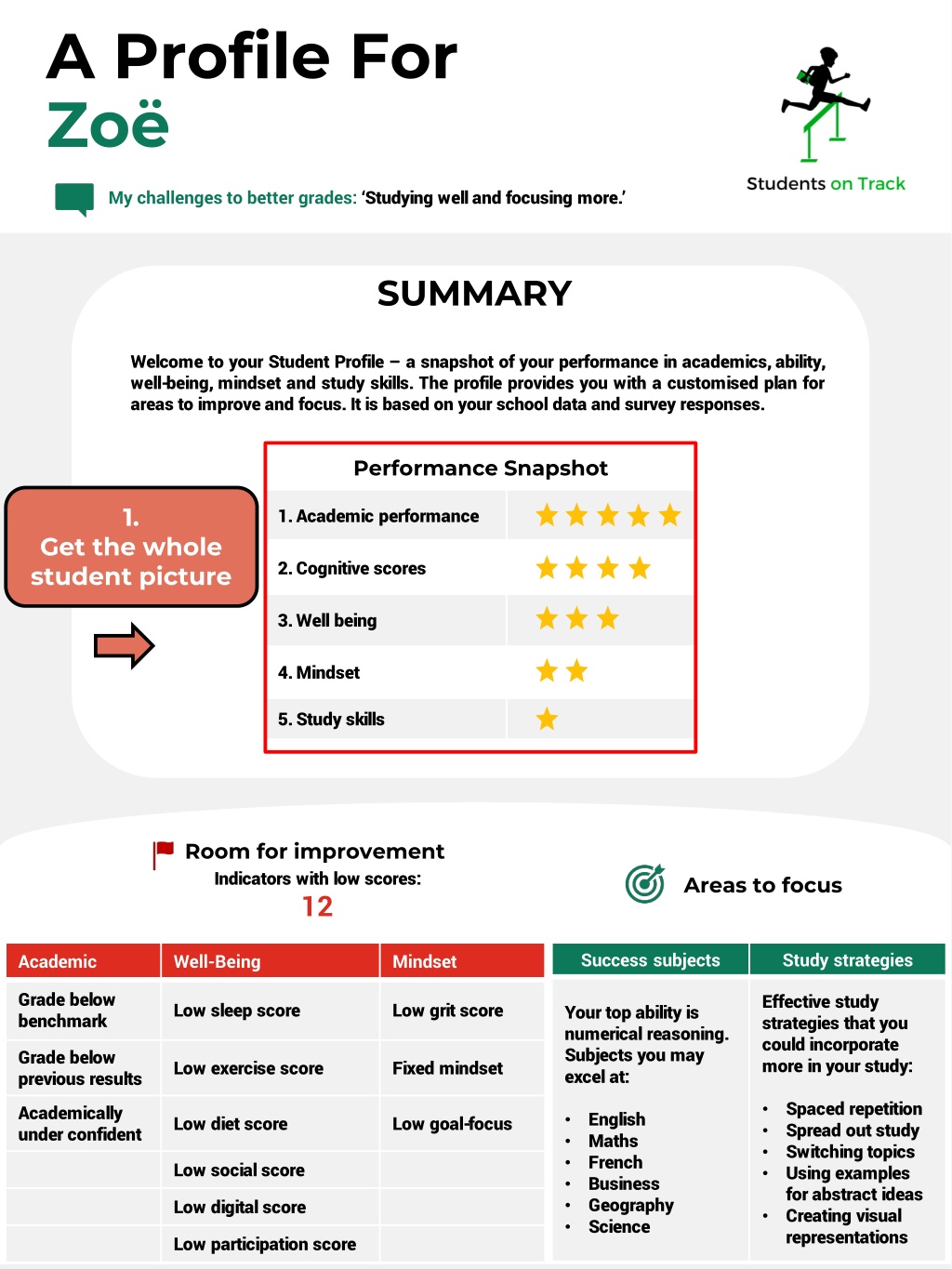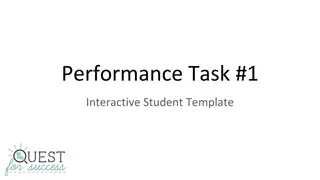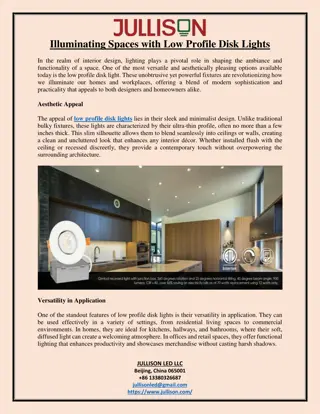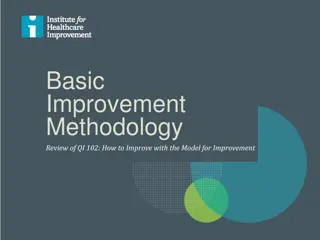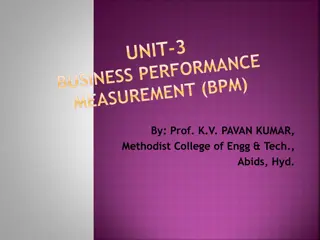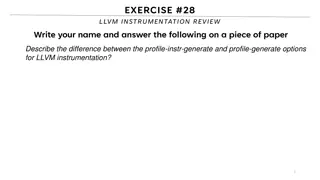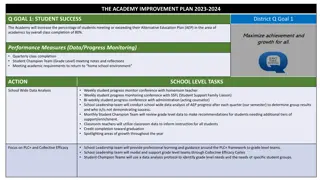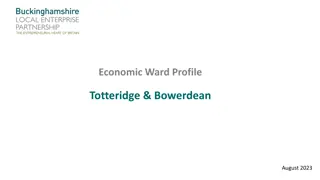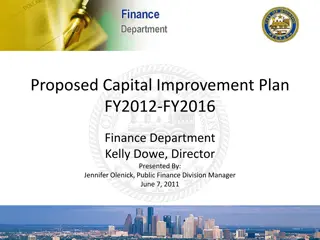Zo's Academic Performance Profile and Improvement Plan
Zo's profile highlights challenges with studying effectively and focusing, with areas for improvement including academic subjects, study strategies, well-being, mindset, and study skills. The profile suggests incorporating effective study strategies, leveraging numerical reasoning skills, and excelling in specific subjects. Zo is encouraged to work on areas such as sleep habits, grit, goal-focus, and social interaction to enhance overall academic performance.
Download Presentation

Please find below an Image/Link to download the presentation.
The content on the website is provided AS IS for your information and personal use only. It may not be sold, licensed, or shared on other websites without obtaining consent from the author.If you encounter any issues during the download, it is possible that the publisher has removed the file from their server.
You are allowed to download the files provided on this website for personal or commercial use, subject to the condition that they are used lawfully. All files are the property of their respective owners.
The content on the website is provided AS IS for your information and personal use only. It may not be sold, licensed, or shared on other websites without obtaining consent from the author.
E N D
Presentation Transcript
A Profile For Zo My challenges to better grades: Studying well and focusing more. SUMMARY Welcome to your Student Profile a snapshot of your performance in academics,ability, well-being, mindset and study skills. The profile provides you with a customised plan for areas to improve and focus. It is based on your school data and survey responses. Performance Snapshot 1. 1. Academic performance Get the whole student picture 2. Cognitive scores 3. Well being 4. Mindset 5. Study skills Room for improvement Indicators with low scores: 12 Areas to focus Success subjects Study strategies Academic Well-Being Mindset Grade below benchmark Effective study strategies that you could incorporate more in your study: Low sleep score Low grit score Your top ability is numerical reasoning. Subjects you may excel at: Grade below previous results Low exercise score Fixed mindset Spaced repetition Spread out study Switching topics Using examples for abstract ideas Creating visual representations Academically under confident English Maths French Business Geography Science Low diet score Low goal-focus Low social score Low digital score Low participation score
A Profile For Zo My challenges to better grades: Studying well and focusing more. SUMMARY Welcome to your Student Profile a snapshot of your performance in academics,ability, well-being, mindset and study skills. The profile provides you with a customised plan for areas to improve and focus. It is based on your school data and survey responses. Performance Snapshot 1. Academic performance 2. Cognitive scores 3. Well being 4. Mindset 5. Study skills Room for improvement Indicators with low scores: 12 2. Target growth 2. Target areas to improve areas Areas to focus Success subjects Study strategies Academic Well-Being Mindset Grade below benchmark Effective study strategies that you could incorporate more in your study: Low sleep score Low grit score Your top ability is numerical reasoning. Subjects you may excel at: Grade below previous results Low exercise score Fixed mindset Spaced repetition Spread out study Switching topics Using examples for abstract ideas Creating visual representations Academically under confident English Maths French Business Geography Science Low diet score Low goal-focus Low social score Low digital score Low participation score
A Profile For Zo My challenges to better grades: Studying well and focusing more. SUMMARY Welcome to your Student Profile a snapshot of your performance in academics,ability, well-being, mindset and study skills. The profile provides you with a customised plan for areas to improve and focus. It is based on your school data and survey responses. Performance Snapshot 1. Academic performance 2. Cognitive scores 3. Well being 4. Mindset 5. Study skills Room for improvement Indicators with low scores: 3. Find where to focus focus 3. Find where to Room for improvement Indicators with low scores: 12 Areas to focus 12 Success subjects Study strategies Academic Well-Being Mindset Grade below benchmark Effective study strategies that you could incorporate more in your study: Low sleep score Low grit score Your top ability is numerical reasoning. Subjects you may excel at: Grade below previous results Low exercise score Fixed mindset Spaced repetition Spread out study Switching topics Using examples for abstract ideas Creating visual representations Academically under confident English Maths French Business Geography Science Low diet score Low goal-focus Low social score Low digital score Low participation score
1. ACADEMIC PERFORMANCE 4. Target mismatches with ability 4. Target mismatches with your ability 1.2. Academic trends 1.1. Academic benchmarking Grade average Previous exam grade average Grade average Benchmark 0 100 0 100 70 90 90 70 Above benchmark Your current average grade is above your ability benchmark, indicating that you are reaching your potential. For further reading, see Reference 1. Trending up Your average grade is higher than your previous grade. For further reading, see Reference 2. 1.3. Academic awareness 1.4. Academic style Generalist Underconfident Specialist Overconfident Compared guessed grade is higher, which suggests academic overconfidence. reading,see Reference 3. to your actual grades, your You tend to very good at a few subjects compared to your peers. For further reading, see Reference 4. For further 1.5. Areas for improvement Grade average Benchmark Based benchmark, you have greatest potential for improvement are: on your ability where English subjects 70 80 Maths 90 70 English Maths French French 70 90 0 100 For further reading, see Reference 5.
1. ACADEMIC PERFORMANCE 6. Track academic trends over time 5. Track academic trends over time 1.2. Academic trends 1.1. Academic benchmarking Grade average Previous exam grade average Grade average Benchmark 0 100 0 100 70 90 90 70 Above benchmark Your current average grade is above your ability benchmark, indicating that you are reaching your potential. For further reading, see Reference 1. Trending up Your average grade is higher than your previous grade. For further reading, see Reference 2. 1.3. Academic awareness 1.4. Academic style Generalist Underconfident Specialist Overconfident Compared guessed grade is higher, which suggests academic overconfidence. reading,see Reference 3. to your actual grades, your You tend to very good at a few subjects compared to your peers. For further reading, see Reference 4. For further 1.5. Areas for improvement Grade average Benchmark Based benchmark, you have greatest potential for improvement are: on your ability where English subjects 70 80 Maths 90 70 English Maths French French 70 90 0 100 For further reading, see Reference 5.
3. WELL-BEING 6. Understand the barriers to unlock well-being 3.1. Sleep 3.2. Exercise Hours sleep per night: Minutes per week: 8 100 Low High Low High On track Room to improve Your sleep score is in the optimal range. Your exercise score is low. You may want to consider exercising more regularly. 3.4. Social 3.3. Diet Fruit & veg servings per day: Meaningful interactions per week: 7 1 Low Low High High On track Room to improve Your social score is low. You may want to engage in more social activity. Your diet score is in a healthy range. 3.5. Digital 3.6. Participation Hours of phone use per day: Regularity of club participation: 2 Low High Low High On track On track Your club participation score is in a good range.Keep up your involvement. Your phone use is in the optimal range. For further reading on the well-being indicators, see Reference 9.
5. STUDY SKILLS 8. Optimise study strategies 7. Optimise study strategies 5.2. Study intensity 5.1. Study strategies Hours study per week outside of classes: You are a Study Scholar. You have exceptional study skills. 8 To boost learning further, focus more on the proven study strategies that you use less often: Light intensive Spaced repetition Compared to your peers,you are a relatively very intensive studier (in the top 25%). The above strategies have been shown to be effective to boost learning. The study strategies you already do well are D and E. For further reading,see Reference 12. For further reading,see Reference 11.
